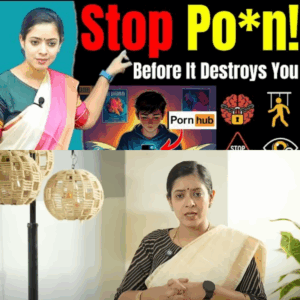The Dark Side of Adult Content: Why You Can’t Stop Watching It
In today’s digital age, access to adult content has become easier than ever, especially for young people. However, behind the instant gratification and curiosity that such content brings lie serious consequences for individuals, families, and even society. Dr. Tanu Jain recently addressed this pressing issue in a thoughtful and scientific manner, shedding light on why so many people—especially youth—find it hard to break free from this cycle.
.
.
.
A Rising Concern Among Youth
Dr. Jain shares that many students, both boys and girls, have come to her at different times, expressing their struggle with addiction to adult content. They admit feeling lost and helpless, unsure how to stop despite knowing it’s harmful. This is not just a problem for teenagers; adults too can fall prey to this addiction.

The Science Behind the Addiction
To understand why adult content is so addictive, Dr. Jain explains the science of the brain. Our brains function on various hormones and neurotransmitters like dopamine and serotonin. When someone watches adult content, the brain releases dopamine, the “pleasure chemical,” creating a sense of satisfaction. Over time, however, the brain becomes tolerant to the same level of stimulation, requiring more extreme or frequent content to achieve the same effect—just like with alcohol or drug addiction.
This constant rush of dopamine can damage the frontal lobe of the brain, which is responsible for rational thinking and decision-making. As this part of the brain shrinks, a person’s ability to think logically and control impulses weakens. This leads to compulsive behaviors, making it even harder to stop watching such content.
Impact on Mental and Physical Health
The consequences of this addiction are far-reaching. It can lead to anxiety, depression, attention deficit disorders, and even changes in personality. Over time, the individual loses interest in real-life achievements and relationships, as the brain craves only the artificial pleasure provided by adult content. The ability to enjoy healthy hobbies, studies, or career ambitions diminishes, and genuine happiness becomes harder to find.
Effects on Family and Relationships
Dr. Jain warns that addiction to adult content can distort perceptions of love and relationships. It can erode trust, intimacy, and purity within families and partnerships. People may begin to see relationships through a distorted, sexualized lens, damaging the core values that hold families together.
Societal and National Consequences
The issue doesn’t stop at the individual or family level. The widespread consumption of adult content contributes to social problems like increased juvenile crime, objectification, and even human trafficking. Dr. Jain highlights that India ranks among the top countries in the world for searching adult content online. This not only affects social values but also poses a national security threat, as such websites can be sources of cyberattacks and data theft.
Breaking the Cycle
Dr. Jain emphasizes that the addiction cycle is not just a matter of willpower; it’s rooted in brain chemistry and neural pathways. However, just as the brain can form new habits, it can also “forget” old ones if given time and effort. She encourages young people to redirect their focus to positive activities—engaging in sports, creative hobbies, or educational content—to gradually weaken the neural networks associated with the addiction.
She reassures those struggling with guilt and shame that it’s not entirely their fault; the content is designed to be addictive. What matters is recognizing the problem and making a conscious decision to break free. Withdrawal symptoms may occur, but persistence and support can help overcome them.
Conclusion
Dr. Tanu Jain’s message is clear: Adult content addiction is a real and growing problem with deep psychological, social, and even national implications. Understanding the science behind it empowers individuals to take control of their minds and lives. By choosing healthier habits and supporting each other, we can protect not only our own well-being but also the fabric of our families and society.
https://youtu.be/erIn8zJAXGE?si=Jk6eR3nef5XRWNRa
News
वर्दी का फर्ज या कोई पुरानी दुश्मनी? सुनसान रेगिस्तान में उस बूढ़े की झोपड़ी तक क्यों पहुँची लेडी अफसर?
रेगिस्तान का दरिंदा और जांबाज अफसर: एक खौफनाक जाल अध्याय 1: रेगिस्तान का सन्नाटा और रहस्यमयी झोपड़ी राजस्थान का वह…
Jab Shohar Dubai Se Wapis Aaya Apni Bevi Ko Dekh Kar Uske Hosh Udd Gaye
सुनहरीपुर का शैतान और कोठे का सच: एक खौफनाक साजिश अध्याय 1: विदाई की वह सुनहरी सुबह हिंदुस्तान के एक…
18 year old girl married a 70 year old sick old man. The entire city was stunned!
सब्र का फल और अल्लाह का इंसाफ: ज़ैनब की अनकही दास्तान अध्याय 1: यतीम का आँगन और लालच की दीवार…
Ghareeb aurat Samajh Kar Gadi Ma Baitha Liya… Jab Haqeeqat Pata Lagi Tu, Sab Hairan Reh Gaye!
चौराहे का सच और वर्दी का इंसाफ: एक अनकही दास्तान भाग 1: कानपुर की तपती दोपहर और एक अजनबी दस्तक…
तलाकशुदा IPS अफ़सर ने सरेआम गरीब सब्जीवाले पति को किया सलाम… सच सामने आते ही पूरा बाज़ार सन्न रह गया
वर्दी का सलाम और अतीत का सच: एक अनकही दास्तान भाग 1: बाजार का शोर और खामोश यादें शहर के…
फटी शर्ट में नौकरी मांगने आया लड़का… मालिक लड़की ने जो किया, पूरी बिल्डिंग देखती रह गई 😱
हुनर का कोई लिबास नहीं होता: फटी शर्ट वाले उस ‘सीनियर डेवलपर’ की अमर दास्तान अध्याय 1: तिरस्कार की वो…
End of content
No more pages to load












